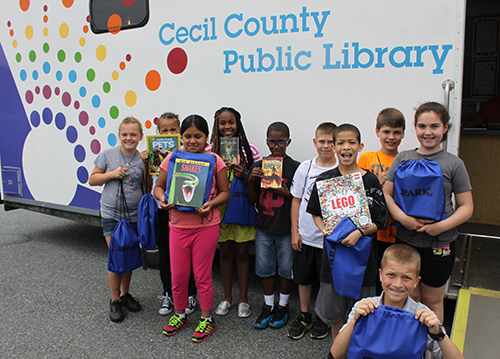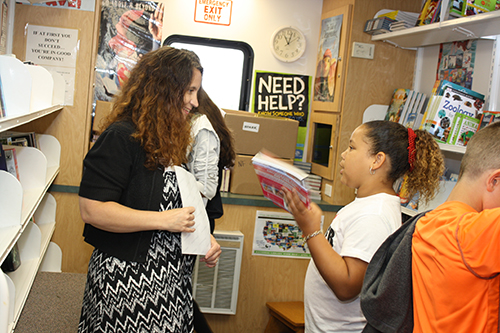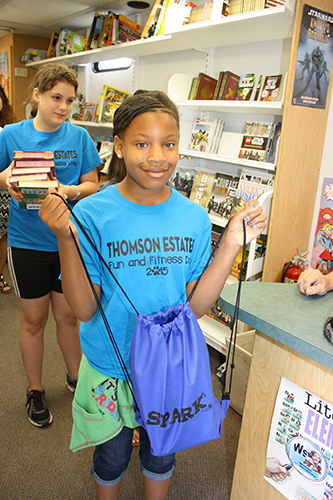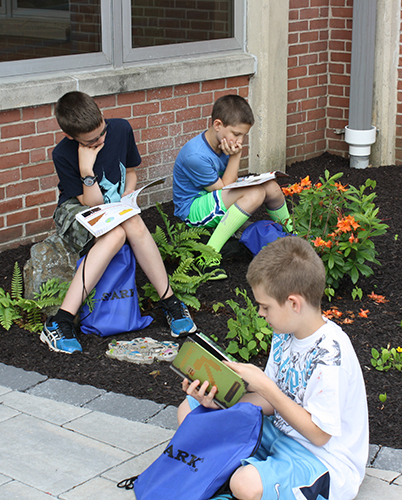Igniting a Love of Reading: CCPL's SPARK Program Removes Barriers
 Many public libraries offer a summer reading program, but the IMLS National Medal award-winning Cecil County Public Library's program is unique in its focus. Sociologist Karl Alexander's 30-year longitudinal study of socioeconomic differences in children's learning (Schools, Achievement, and Inequality: A Seasonal Perspective, 2001) concluded that access to libraries over the summer was the single most determining factor in whether or not a child makes educational gains during the summer, combating both summer learning loss and, in the long term, strengthening high school graduation rates.
Many public libraries offer a summer reading program, but the IMLS National Medal award-winning Cecil County Public Library's program is unique in its focus. Sociologist Karl Alexander's 30-year longitudinal study of socioeconomic differences in children's learning (Schools, Achievement, and Inequality: A Seasonal Perspective, 2001) concluded that access to libraries over the summer was the single most determining factor in whether or not a child makes educational gains during the summer, combating both summer learning loss and, in the long term, strengthening high school graduation rates.
Because of this research, Cecil County Public Library (CCPL) in Maryland increased the marketing of its Summer Reading & Learning Program and its outreach to the county's low-income children in Title I schools. CCPL developed a digital story titled Year-Round Learning Success to encourage school and principal participation, as well as to demonstrate value outside the public library community. Since 2009, Title I student participation in the program has grown by 50 percent.
CCPL meets the ever changing needs of its community by adjusting focus within the scope of its mission, actively listening and seeking feedback from the community, applying research and data to guide decisions, and developing high-impact community partnerships. During the economic recession, CCPL staff learned from lower income parents that lack of transportation and fear of accruing overdue fees were major factors in keeping their children away from the public library in the summer.
In 2012, CCPL responded by delivering the SPARK (Students Progress and Achieve with Reading Kits) program. The key ideas behind the SPARK program were developed by applying research findings from a study by Dominican University (PDF), which concluded that students who participated in summer reading programs scored higher on the reading achievement test at the beginning of the next school year than those who did not participate. To close the achievement gap in reading, the Dominican study made several recommendations, including 1) recognizing public libraries' significant role in addressing this challenge, 2) expanding the definition of reading beyond books, 3) providing more books in economically depressed neighborhoods, 4) helping low-income children build home libraries, and 5) promoting librarians' role in influencing a love of reading and life-long learning.
The SPARK program encourages students in 5th and 6th grades to read more over the summer in three key ways: 1) by removing barriers to libraries such as transportation and fines, 2) by allowing students to select their own reading materials and 3) by engaging with highly skilled librarians. Research has shown that the most substantial drop in daily reading occurs between the ages of 9 and 13, making these transition years between elementary and middle school the perfect time to focus additional library resources.
 CCPL librarians make classroom visits to students at Title I schools in the fall and survey their interests. This paper survey (PDF) is presented in a very visual way that helps students to easily identify which subjects and genres appeal to them. Children's and teen librarians then review the surveys and build a collection of books based on student interests. Titles range from high-interest middle grade fiction series such as Origami Yoda, Maze Runner, Maximum Ride and the graphic novel Smile, to non-fiction subjects such as Minecraft, cookbooks, fashion design and science experiments.
CCPL librarians make classroom visits to students at Title I schools in the fall and survey their interests. This paper survey (PDF) is presented in a very visual way that helps students to easily identify which subjects and genres appeal to them. Children's and teen librarians then review the surveys and build a collection of books based on student interests. Titles range from high-interest middle grade fiction series such as Origami Yoda, Maze Runner, Maximum Ride and the graphic novel Smile, to non-fiction subjects such as Minecraft, cookbooks, fashion design and science experiments.
Just before the end of the school year, the SPARK collection is loaded onto the CCPL bookmobile, which then travels to each school accompanied by the local library branch's children's and teen librarians. Students are given a special SPARK backpack and librarians guide each student in choosing five books to read and keep fine-free for the whole summer.
Teaching the skills that allow young readers to self-select their own reading materials is a critical method for encouraging students to read more, especially during out-of-school time. A 2013 study by the University of Rochester's Medical Center determined that students who were allowed to select their own reading materials experienced lower levels of reading loss over the summer (Summer Slide Reduced by Letting Kids Pick Their Own Summer Reading, 2015). Who better to foster these skills in children and teens than librarians? Highly-skilled professionals who possess vast literacy, educational and social development knowledge, librarians can effectively assist readers in making the connections that put them on the path toward lifelong learning.
Analysis of three years of SPARK program data indicates that approximately 20 percent of participants experienced an increase in lexile (reading level) score after summer break when compared to a control group of a similar socio-economic level and age range. Ninety percent reported having read at least a portion of their SPARK books, and the majority of participants felt that they read more over the summer than they normally would have due to their participation in the program.
 Participant feedback includes:
Participant feedback includes:
"I usually don’t have any books at my house. SPARK gave me a lot of books to read. I like being able to pick my own books."
"I think SPARK is awesome because you can select any kind of book you want. It gave me the chance to be a better reader. I would have never read this summer if it wasn’t for SPARK."
"I read every single one of the SPARK books and it gave me something to do besides sit and watch TV."
SPARK helped me:
- Learn a different language.
- Want to read more and helps me as a reader.
- Because I used to read very slow so now I read pretty fast.
- To have fun reading in the summer because before I got SPARK books I never used to read but when I actually had something I was interested in I was reading on and off.
- Read more and create a habit of reading books. It also helped me have fun and enjoy the greatness of reading
- Read lots of different genres of books.
- Read a lot more than I used to.
The best thing about SPARK is:
- You can read for fun and it's free.
- It gives kids an opportunity to read if they don’t have money to buy books.
- It helps kids read better for their next grade level.
- You can read during the summer so you can read better.
- You have something that would keep your mind active other than playing video games, swimming or tanning.
- They give you books that you can take home and you don’t have a due date to take them back.
- When you can't go to the library you already have books.
- You get a chance to read books you haven't tried before, or reread books you liked but don't own personally.
Since its launch in 2012, the SPARK program has connected 2,700 Title I students with nearly 12,000 books over the summer. Cecil County Public Schools’ Superintendent D’Ette Devine calls the SPARK program "a model of school-library partnership that we hope will be expanded in our county and nation-wide." The program has received additional public and private funding to expand the program to more Title I elementary schools and middle schools. To see the SPARK program in action, check out this digital story, "Innovative Solutions for School Success."
 Two years ago, CCPL also expanded the reach of the Summer Reading & Learning Program using its Bookmobile to connect with 13 low-income housing neighborhoods in the county, where common barriers such as a lack of transportation have, in the past, prevented children and teens from accessing reading materials housed in physical library branches during the summer. As a result of taking the program out to the community via the library's bookmobile, over 1,000 children and teens were able to participle in the Summer Reading & Learning Program for the first time and now continue to participate each year.
Two years ago, CCPL also expanded the reach of the Summer Reading & Learning Program using its Bookmobile to connect with 13 low-income housing neighborhoods in the county, where common barriers such as a lack of transportation have, in the past, prevented children and teens from accessing reading materials housed in physical library branches during the summer. As a result of taking the program out to the community via the library's bookmobile, over 1,000 children and teens were able to participle in the Summer Reading & Learning Program for the first time and now continue to participate each year.
To successfully implement, sustain and expand a library outreach program like SPARK, leveraging community partnerships, developing a communication plan that considers all operational levels and taking a systems-thinking approach to planning is essential.
Forming new partnerships and building upon those previously established allowed CCPL to maximize resources to achieve greater impact. For many years, CCPL has worked closely and collaboratively with the Cecil County Public Schools (CCPS) to advance education. CCPS continued this collaboration with its support of the library's SPARK program by providing access to students and staff multiple times throughout the school year, including supplying anonymized data to help librarians measure overall progress in student reading scores. In addition, school staff and students contributed to the evaluation of the SPARK program to determine its effectiveness and to make recommendations for future improvements.
Establishing funding partnerships is also key. At a time when government funding is limited, developing sponsorships and grants within the local community is a strategic solution for offsetting program costs. CCPL secured funding for SPARK from public and private sources focused on furthering education and serving youth.
Detailed planning and regular communication are essential to ensure all library staff has a clear understanding of the program's goals and timelines. While the SPARK program serves children and teens, multiple departments beyond youth services were impacted and involved in its implementation. Considerations related to the added responsibilities and workload on the materials processing department created by increased ordering, as well as challenges faced by those who manage the library's facilities due to the need for additional storage, had to be addressed. By taking a systems-thinking approach in the early stages of program design, staff was able to proactively devise solutions.
When launching any new program, challenges and obstacles are to be expected. In CCPL's case, an understanding that the temporary impact on an organization's workflow is minimal compared to the lifelong impact on a student, makes for a program well worth the time and energy expended.
About CCPL
Cecil County Public Library is making a critical difference in education, workforce and economic development by implementing our mission: to provide access to educational and cultural resources for all and to promote individual and community success. The library serves over 62,000 citizens with seven branch locations, an outreach bookmobile, broadband, WiFi and 24/7 website access. To learn more, visit www.cecil.ebranch.info and follow us on Facebook and Twitter.
Photos:
From top: Students pose with their newly chosen books outside the bookmobile; students ask librarians questions as they pick their books; a student with the SPARK bookbag, which she gets to keep; kids instantly absorbed in their selections. All photos courtesy of Cecil County Public Library.
